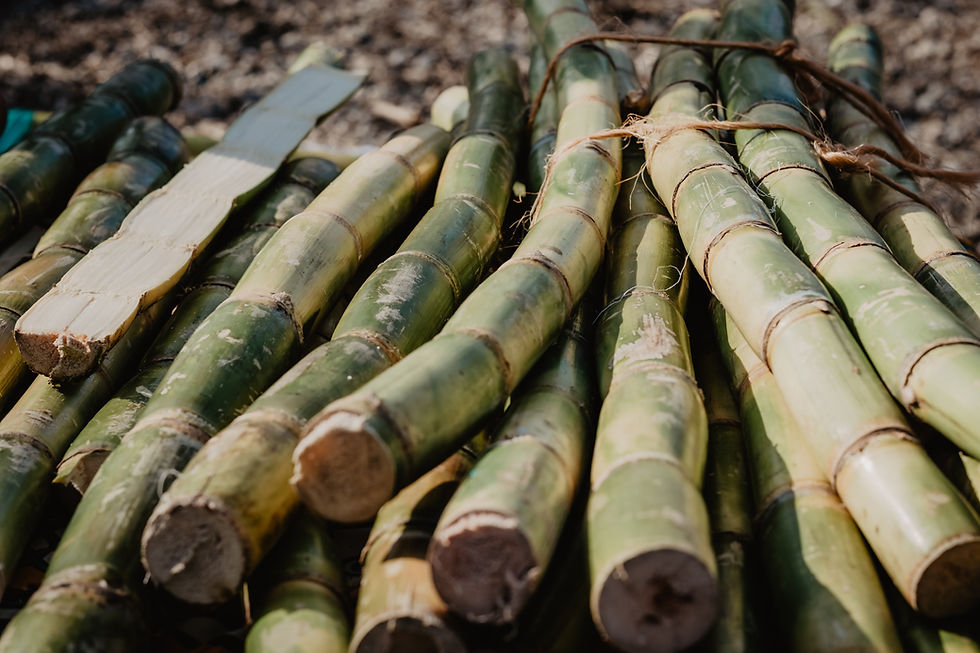Interview: Ryan Chetiyawardana
- Anna Sulan Masing
- Aug 17, 2020
- 3 min read
Updated: Aug 18, 2020
Systems of Knowledge in the Bar World
This is our first interview for SOURCED, and it was important to start with a person from the drinks world because when culinary systems are spoken about often food becomes the focus. But of course drinks are also part of culture, are ingredients, and have complicated sourcing networks too.
How we approach all the work for SOURCED, including interviews such as this, is to see them as part of bigger pieces of research. We are looking to find questions, to explore what ‘we’ [the multiple 'we's that exist in the conversations on food and drink systems] mean when we use terms such as culinary systems, what are the industry concerns, and to locate where are we in the now, to build a better future. My PhD research was based on qualitative and ethnographic research and was practice-based; therefore, it makes sense to me to interview people as a way of investigating topics. This is probably why I have found myself in journalism.
I also think that sometimes the research is more interesting than the conclusions! So, this is just the beginning and we’re inviting you along for the ride as we explore the questions that have been on our mind.
Ryan Chetiyawardana, aka Mr Lyan, opened White Lyan in London in 2013 as the first cocktail bar in the world to use no perishables; no fruit and no ice!
Sustainability has been a key feature in a lot of his work, particularly around waste, across all his projects - White Lyan, Super Lyan, Dandelyan, Lyaness, Cub, Silver Lyan. Ryan has built a global bar business that focuses on collaboration and building bridges between the food and drink divide. Listen to the interview on the link below.
In this interview we think about knowledge as an ingredient, and Ryan discusses how the systems of knowledge travel in the bar world; plus his learnings and inspirations and how the bar world - including himself - has underestimated the consumers desire for in-depth knowledge.
I enjoyed hearing Ryan discuss re-thinking how to make a cocktail - something that has been happening in the industry, but I don’t think has moved into mainstream, especially not media. This is a decolonalisation of the bar world – if not using that specific word.
Ryan was very positive about big brands, explaining that changes they make have huge impact in the industry. I am much more into radicalism and so want to tear down all the current structures! Build new ones! But also, I can say that with the privilege of knowing that they aren’t going to disappear overnight, and I can work in my small way to create change (like with SOURCED), whilst these systems are in place and I can / do benefit from them. One thing I have been learning over the last six months is that we need to find ways to exist within these structures - find ways to be safe, progressive and care about the environment and people. Because now is crucial and that is what we have.
So, I think we do need positive voices like Ryan, who talks about accountability and has access to many parts of the industry with an idea of change and moving forward.

Ryan is inspired by a number of people and ideas, here are some of his recommendations:
Arielle Johnson, a food and flavour scientist who is especially interested in in these topics through the contexts of cooking, restaurants, and food systems - her book is out next year!
Silo: The Zero Waste Blueprint by Douglas McMaster
Scientists on Instagram, such as Katie King
Fave artists: Picasso, Schiele, Jenny Saville, Georgia O'Keeffe, Eine, Faile, Warhol, Hockney.
Writers: Orwell, Huxley, Alan Moore, Steinbeck, Wodehouse, Bill Watterson “mainly dystopian stuff it seems!”
I would recommend following Radical Xchange In June they held a conference called Gimme Brown which a full day of panel discussions on booze with only BIPOC people – it was incredible. It looks like they will be hosting similar events, so do watch!










